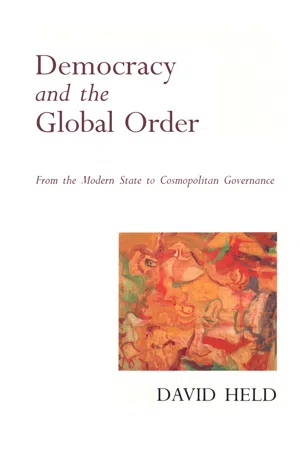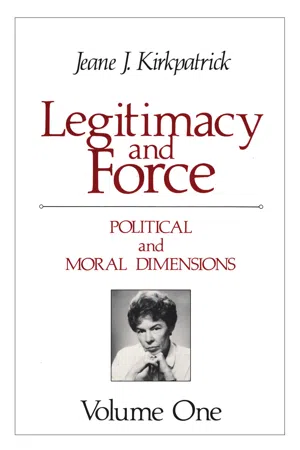Politics & International Relations
Foundations of American Democracy
Foundations of American Democracy refers to the principles and values that underpin the American political system. These include the rule of law, individual rights and freedoms, representative democracy, and the separation of powers. These foundations are enshrined in the US Constitution and have shaped American politics and society since the country's founding.
Written by Perlego with AI-assistance
Related key terms
2 Key excerpts on "Foundations of American Democracy"
- eBook - ePub
Democracy and the Global Order
From the Modern State to Cosmopolitan Governance
- David Held(Author)
- 2013(Publication Date)
- Polity(Publisher)
Part IIIReconstruction:Foundations of Democracy
Passage contains an image
7
RETHINKING DEMOCRACY
The transformation of politics which has followed in the wake of the growing interconnectedness of states and societies and the increasing intensity of international networks requires a re-examination of political theory as fundamental in form and scope as the shift which brought about the conceptual and institutional innovations of the modern state itself. It has always been open to dispute how far the claims of the modern state to be ‘independent’ and ‘impartial’ were redeemed in practice. To the extent that the state has been locked into the maintenance and reproduction of systematic inequalities of power and resource, distorting decision outcomes in favour of particular interests, the basis of its claim to legitimacy and distinct allegiance has been open to question. Nonetheless, the idea of the modern state was a guiding political orientation with far-reaching consequences. How far this idea remains applicable to the contemporary era, faced with distinctive and novel forms of power and authority, is, however, another matter. Likewise, how far the concepts of political order, authority and the democratic good can be elaborated at the level of state institutions and practices alone is a pressing and contentious problem.The chapters which comprise the following parts (III and IV ) are focused on the reconstruction of political ideas. Reconstruction in this context connotes reflection upon the basic concepts and circumstances of modern politics with the aim of elucidating the conditions and possibility of democratic political community in the contemporary world. The chapters take as their background the empirical context outlined in part II , but, unlike part II - eBook - ePub
Legitimacy and Force: State Papers and Current Perspectives
Volume 1: Political and Moral Dimensions
- Jeane J. Kirkpatrick(Author)
- 2018(Publication Date)
- Routledge(Publisher)
Although democracy emphasizes procedures—elections, terms of office, due process—its underpinnings, what Ernest Barker called the “agreement to disagree,” are substantive. The substantive agreement that underlies democratic political institutions is rich and complex in assumption, approaches, beliefs, values. It includes a necessary minimum of trust. This necessary bond of trust—emphasized by writers as diverse as Jean Jacques Rousseau, Walter Bagehot, Gabriel Almond and Henry Fairlie—defines a community and guarantees the existence of shared purposes: to promote the general welfare, to provide the common defense, to preserve the Constitution—that sort of thing. Where people are not agreed on fundamentals, they may decide to seize power rather than campaign for it, to shoot their opponent instead of debating him, to organize a violent demonstration instead of a peaceful march, to lie rather than discuss truthfully, to enslave their defeated opponents rather than continue discussion with them.The “agreements” which democracy requires are rooted, of course, in a common culture and in habits, both of which are resistant but not impervious to change. In our day, mass media renders culture more accessible to manipulation than at any past time. Moreover our traditional culture itself embraces change. However, serious students of politics from Plato through the Founding Fathers until today have been convinced that the basic moral, religious, and epistemological conceptions that constitute the “glue” of a society and the foundation of its institutions should be protected, nurtured, and passed on to succeeding generations. Aware of democracy’s special propensity to faction, believing like Tocqueville that “men of democracies appear always excited, uncertain, eager …,” the Founding Fathers sought to remove basic questions most likely to spur the passions from the political arena—in part by removing them from government’s reach altogether. Thus, the many Constitutional prohibitions: Congress shall make no law respecting the establishment of religion, restricting the freedom of opinion or press, and so forth. Only when it has broken down, as in the Civil War, or at its edges, with fringe parties, has the nature and foundations of our Union become the object of serious questioning.
Learn about this page
Index pages curate the most relevant extracts from our library of academic textbooks. They’ve been created using an in-house natural language model (NLM), each adding context and meaning to key research topics.

